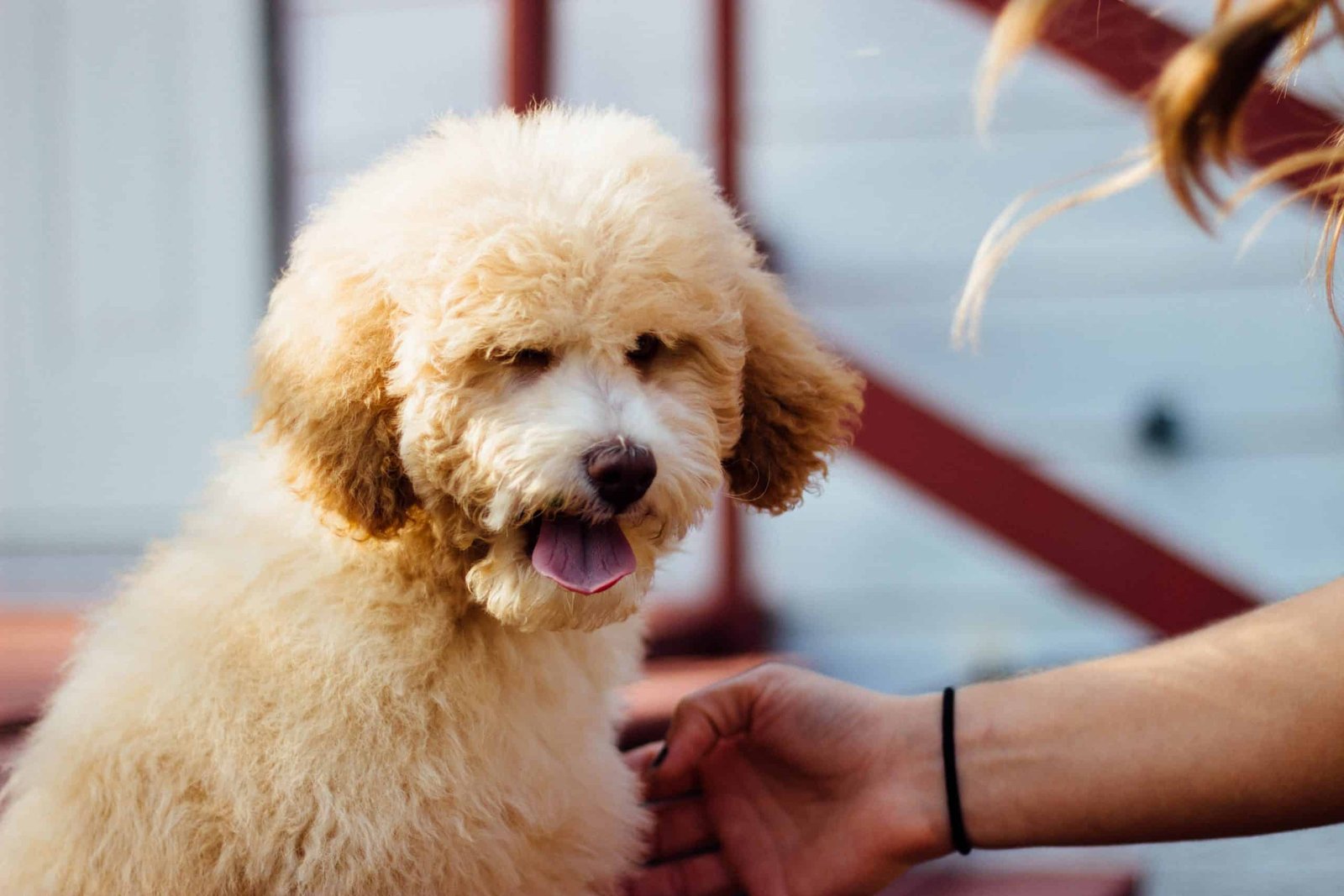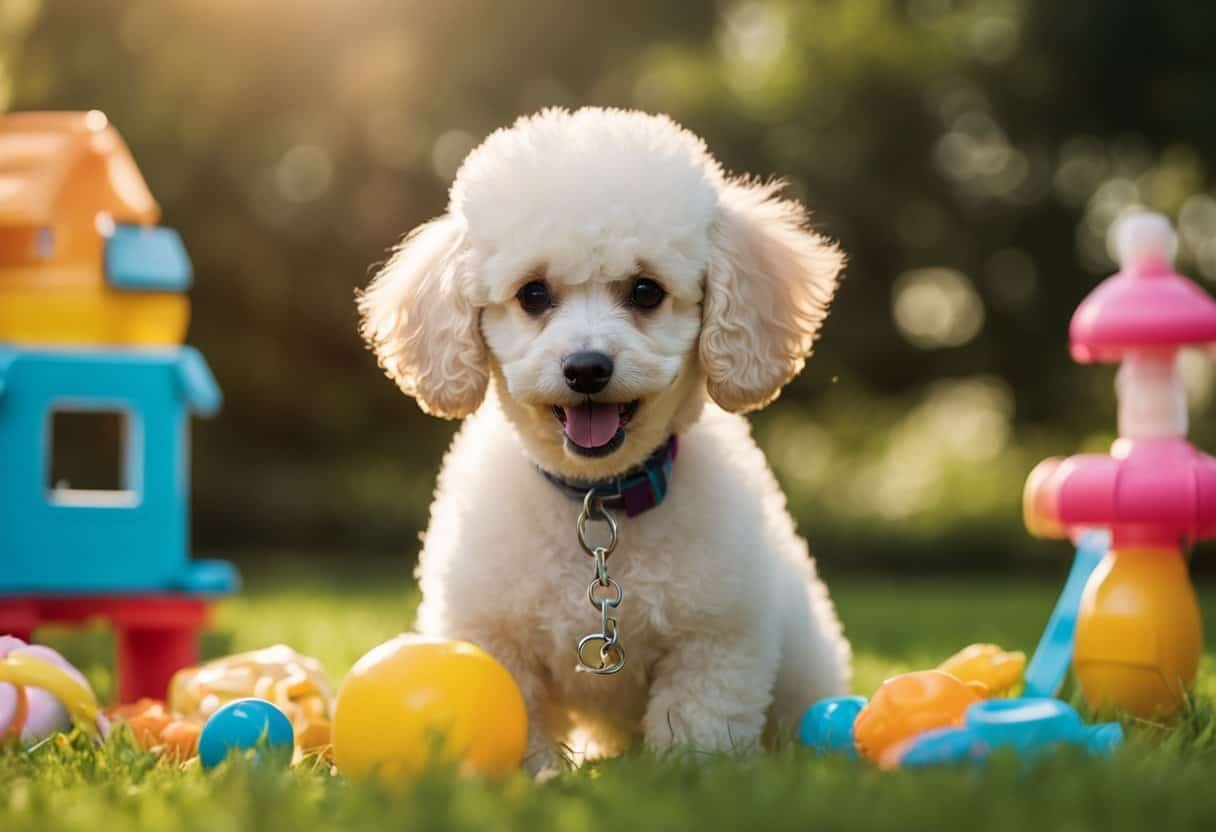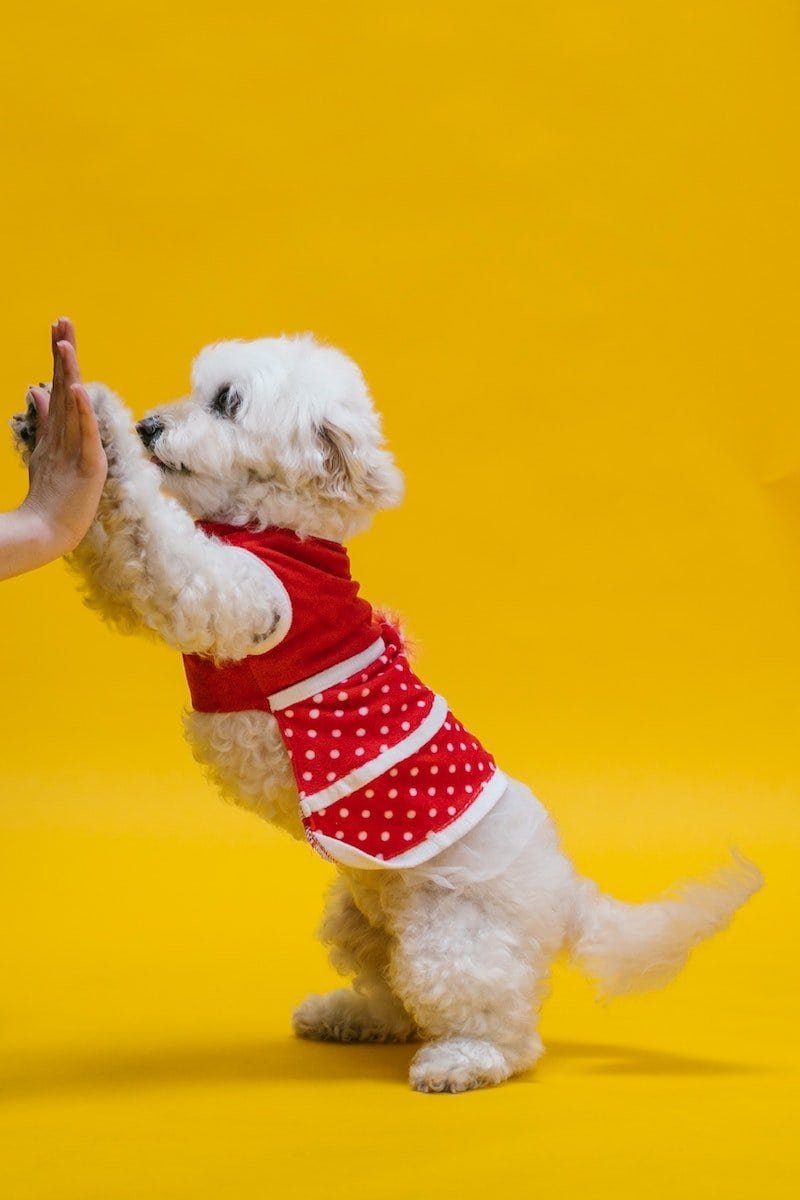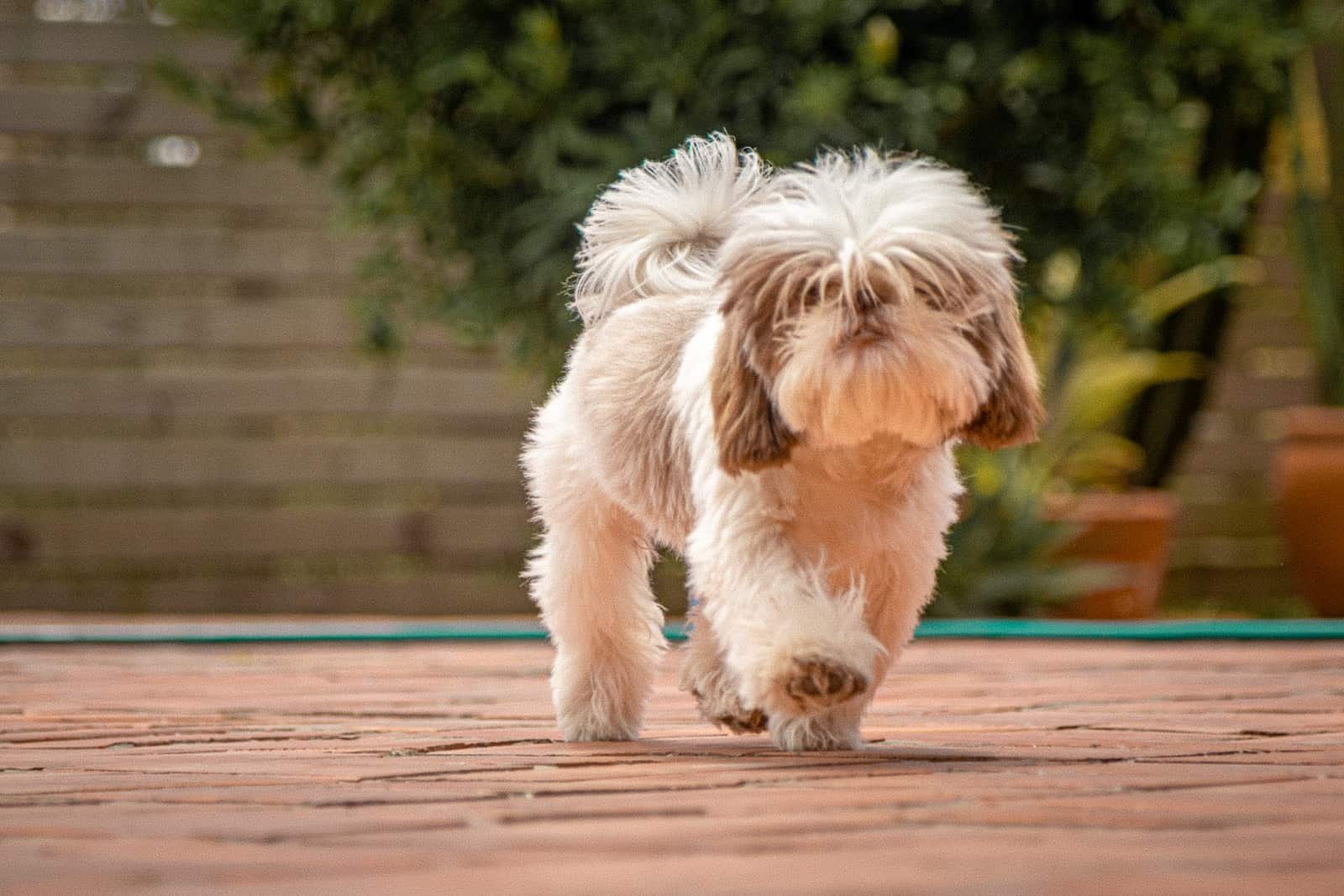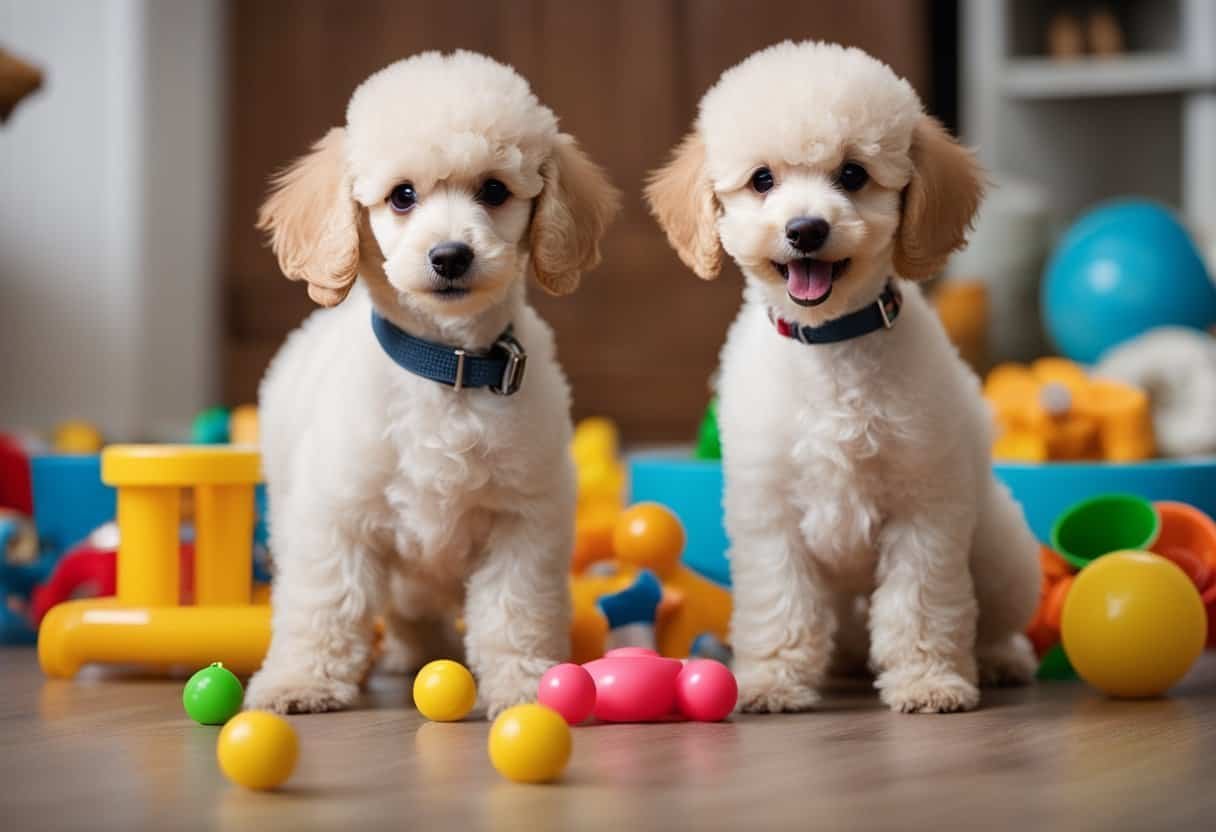
Welcoming a poodle puppy into your life marks the beginning of a joyful journey filled with growth and discovery. Poodles are intelligent, active, and affectionate dogs known for their curly coats and keenly alert nature.
In their first year, these puppies hit numerous developmental milestones that are crucial for their physical, mental, and emotional well-being. Your involvement in their progression from a cuddly pup to a well-rounded adult is vital.
By understanding what to expect in the first year, you can foster a nurturing environment that caters to their health, nutrition, and training needs.

As your poodle puppy grows, you will encounter various stages of development that demand different forms of care and attention.
The initial steps at home will set the foundation for their behavior, while ongoing training fundamentals are key to their cognitive development.
Throughout their growth, grooming and physical care will play a significant role in their comfort and appearance, staying true to the poodle’s distinctive look.
Emotional development is also paramount; forming a bond early on through behavior reinforcement and play will help shape their social skills.
In navigating these milestones, you’ll find joy in the small victories and a deeper connection with your furry companion.
Key Takeaways
- Your poodle puppy’s first year is packed with important growth and behavioral milestones.
- Providing consistent training, proper nutrition, and grooming is essential for their development.
- Engaging regularly in physical and emotional activities strengthens your bond and supports their well-being.
The First Steps at Home
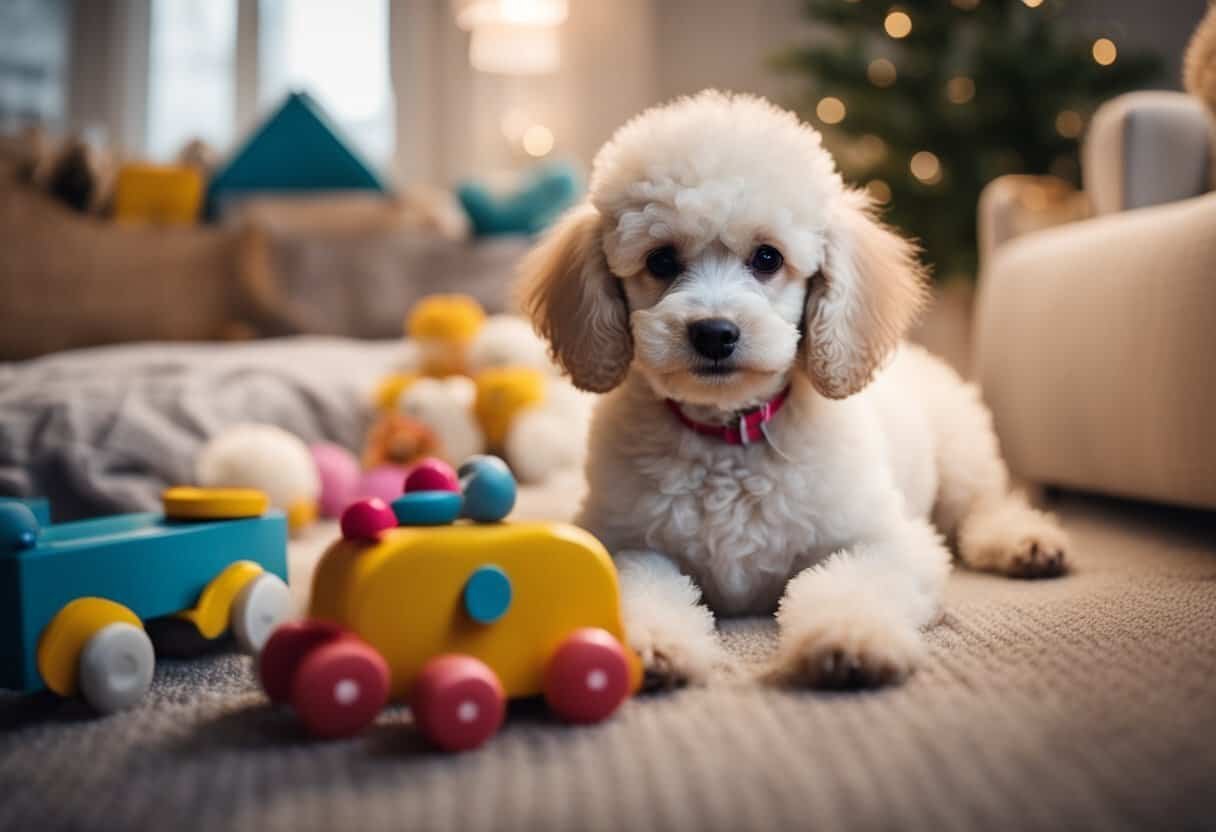
When you bring your poodle puppy home, the initial focus should be on aiding their adjustment to the new living space and establishing a consistent daily routine.
Your poodle’s ability to adapt quickly and learn from their surroundings is influenced by the tone you set during this phase.
Adjusting to the New Environment
Upon arrival, your poodle will need time to become familiar with the new sights and sounds of their home.
Start by designating a quiet and comfortable space just for them. It’s often recommended to get crate training started early, as it provides a sense of safety for your puppy and aids in housebreaking.
- Crate training: Introduce the crate gradually, making it a positive space with comfy bedding and occasional treats.
- Weaning and nursing: If your poodle is still at the age of weaning from nursing, ensure this transition is smooth by providing appropriate puppy-specific nourishment.
- Familiarizing with home: Let your poodle explore their new surroundings under supervision to begin associating the home with security and care.
Setting Up a Routine
Consistency is key to helping your poodle puppy adapt to their new life with you.
Establishing a routine early on is essential for their development and can set the stage for successful training.
- Feeding schedule: Create a strict feeding schedule, aiding the weaning process for those freshly weaned, and promoting healthy digestion.
- Sleeping habits: Decide on sleeping arrangements—whether it’s a dog bed in your bedroom or the crate—and stick to it each night to reinforce where they should sleep.
- Bathroom breaks: Take your puppy out regularly to the same spot for bathroom breaks, as routine is critical for effective house training.
Health and Nutrition
Your Poodle puppy’s first year is a crucial time for setting the foundation of health and nutrition that contributes to a lifetime of wellbeing.
Focused attention on proper feeding practices, keeping up with the vaccination schedule, and navigating the teething process are essential for growth and development.
Proper Feeding
Feeding your Poodle puppy high-quality puppy food is vital for proper growth.
Puppies typically need to be fed three to four times a day. Here’s a structured approach to puppy nutrition:
- Weeks 4-8: Transition from nursing to solid foods, introducing a mix that includes goat’s milk for easier digestion.
- Months 2-6: Gradual increase in solid food quantity; move towards a feeding routine of three meals per day.
- Months 6-12: Transition from puppy formula to adult dog food tailored to the specific needs of Poodles, which may vary in caloric content based on activity level and size.
Vaccination Schedule
Adhering to a strict vaccination schedule is crucial to protect your puppy from infectious diseases.
Your vet will recommend a series of vaccinations tailored to your Poodle puppy’s needs. Here’s a typical schedule:
- 6-8 weeks: First round of DHPP (distemper, hepatitis, parainfluenza, parvovirus)
- 10-12 weeks: Additional vaccinations may include leptospirosis, bordetella, and Lyme disease, depending on your area
- 16-18 weeks: Final round of DHPP and rabies vaccination
Note: Always follow your veterinarian’s specific recommendations for your puppy’s vaccinations.
Dealing with Teething
Poodles will lose their baby teeth and grow adult teeth during their first year.
Expect some chewing behavior as this can be uncomfortable for your puppy. Ways to help include:
- Provide safe chew toys to alleviate discomfort.
- Maintain oral hygiene with regular brushing and vet-recommended dental products.
- Monitor your puppy’s mouth regularly to ensure baby teeth are falling out on schedule and adult teeth are growing in properly.
Training Fundamentals
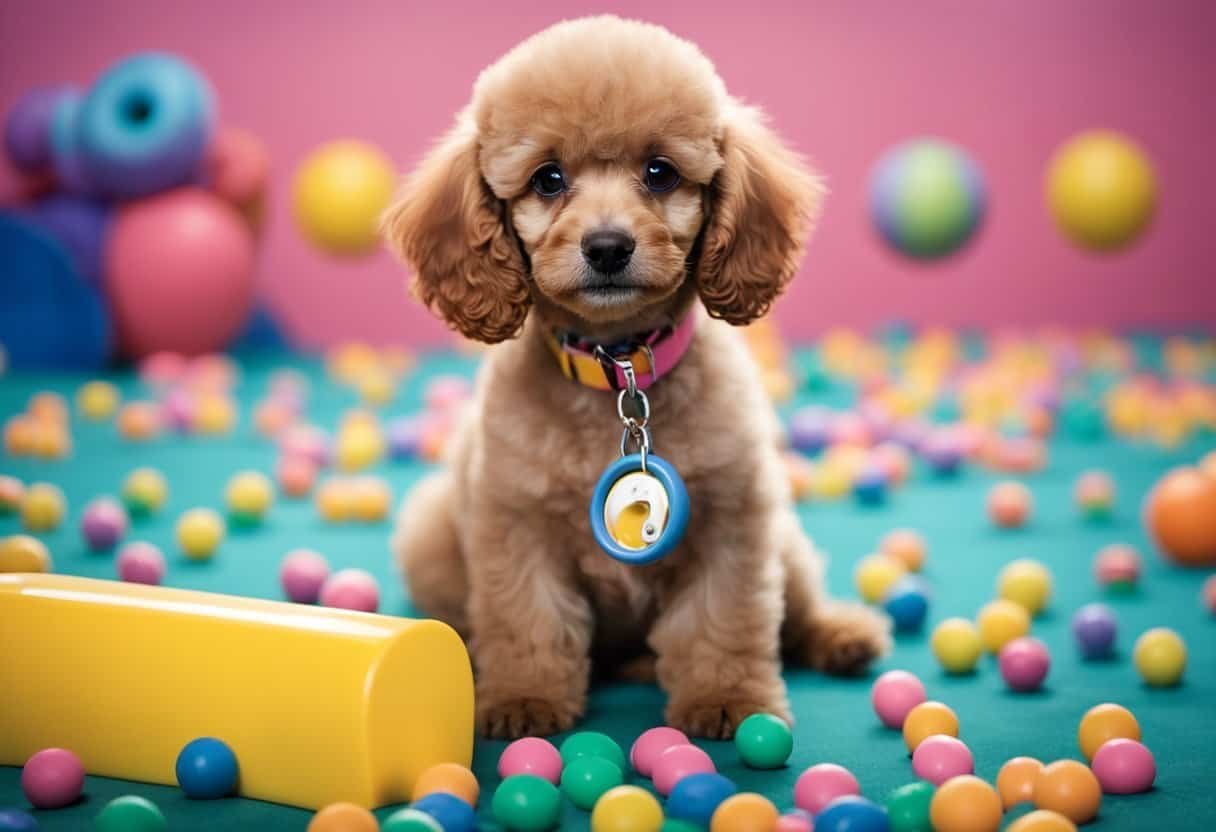
Establishing a solid foundation in the first year sets the tone for your Poodle puppy’s behavior and obedience.
If you start early and stay consistent with positive reinforcement, you can establish good habits and foster a strong bond between you and your puppy.
Basic Commands and Obedience
Begin teaching basic commands such as sit, come, down, and stay early in your puppy’s life.
Consistency is key, so practice these commands daily using clear and concise language. Always use positive reinforcement; when your puppy obeys, reward them immediately with praise and treats to reinforce the behavior.
| Commands | Tips |
|---|---|
| Sit | Use a treat to guide your puppy into a sitting position, then praise. |
| Come | Start with short distances and reward your puppy when they come to you. |
| Down | Lead your puppy to a lying position with a treat and give positive feedback. |
| Stay | Begin by asking for brief periods of staying and gradually increase duration. |
House Training
House training or potty training your Poodle puppy requires patience and routine.
Take your puppy out frequently, especially after meals and naps, to the same spot to reinforce where they should do their business.
Praise your puppy enthusiastically after they eliminate in the correct location. Consider using a crate as a safe space for your puppy, as it can help regulate their need to go and prevent accidents.
Socialization Techniques
Socialization is critical for developing a well-rounded, confident Poodle puppy.
Introduce your puppy to different people, animals, environments, and sounds early on.
Encourage interaction in a controlled manner to ensure positive experiences. Puppy training classes can be especially helpful for socialization while reinforcing obedience skills and training.
Grooming and Physical Care
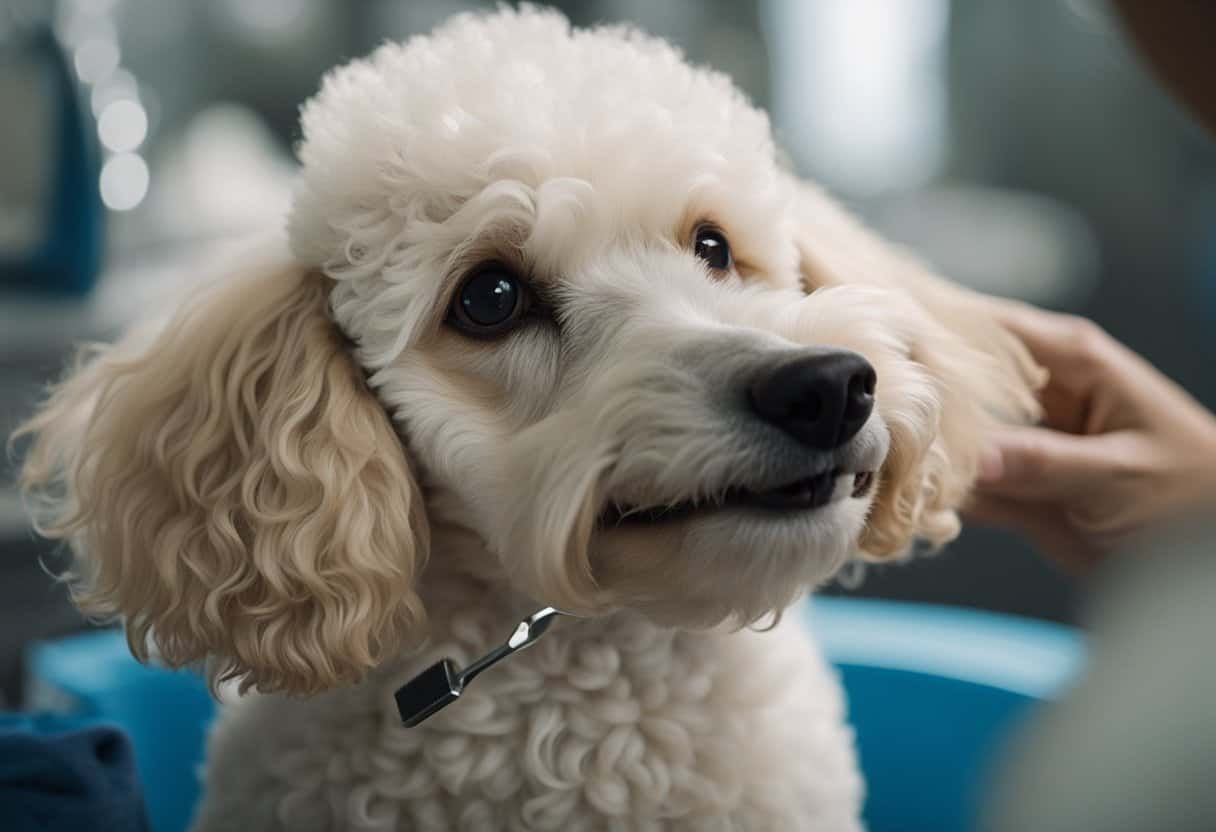
Grooming and physical care are essential for maintaining your Poodle puppy’s health and happiness.
Proper grooming not only keeps them looking their best but also prevents issues such as matting and infections. Starting these routines early will help your puppy get used to regular grooming sessions.
Coat Maintenance
Your Poodle’s coat needs regular attention to prevent matting and tangles. Aim to brush your puppy’s coat at least every other day.
Use a slicker brush and a metal comb for brushing. When you notice the coat starting to mat, address it promptly to keep your puppy comfortable and their skin healthy.
Regular brushing distributes natural oils, keeping the coat shiny and reducing the need for frequent baths. However, when a bath is necessary, use a dog-specific shampoo. Make sure you rinse all soap out to prevent skin irritation.
As your puppy grows, they’ll require full grooming sessions. During these sessions, a professional groomer can trim the coat, clean the ears, and provide a thorough bathing experience. This should be done every 3-6 weeks, depending on your Poodle’s coat growth.
Nail Trimming
Trimming your Poodle’s nails is a crucial part of their grooming routine. Long nails can lead to discomfort and even structural issues over time.
Listen for a clicking sound on hard floors—that’s a sign the nails are too long. It’s best to trim your puppy’s nails every 3-4 weeks.
If you’re unsure how to safely trim them, ask a vet or groomer to show you the proper technique. You can also consider having a professional perform the task to minimize the risk of cutting into the quick, which can cause bleeding and discomfort.
Behavior and Emotional Development
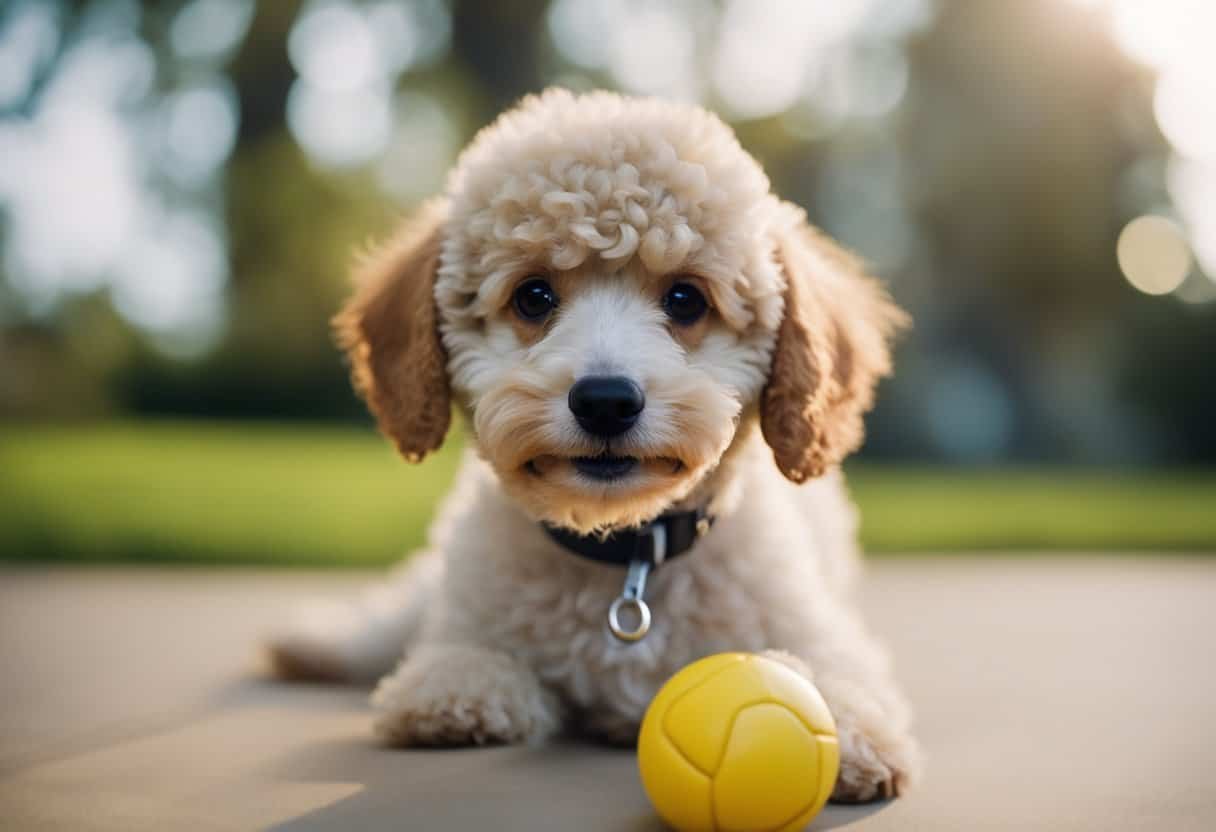
In the first year of raising your Poodle puppy, understanding their behavioral patterns and emotional needs is essential for a healthy bond and development. Building confidence, reducing anxiety, and employing positive reinforcement are key strategies during this formative period.
Understanding Poodle Behavior
Poodle puppies exhibit a range of behaviors that can indicate their intelligence and emotional state. Your Poodle’s behavior often reflects their response to stimuli in their environment.
It’s vital to introduce diverse experiences early on, as this can greatly aid in their behavioral development.
Regular play sessions are not only fun but also crucial for their learning and confidence-building.
Encouraging curiosity and gently guiding them through new interactions can lead to a well-adjusted adult dog.
A variety of positive reinforcements like praise, treats, and cuddles, help solidify good behaviors.
To learn about shaping a positive behavioral foundation during the critical socialization period, you might want to read up on socialization milestones, which are instrumental in mitigating fear and anxiety.
Managing Separation Anxiety
Separation anxiety can be a challenge with Poodles due to their deep bond and love for their families.
This anxiety manifests in behaviors such as whining, barking, or destructive chewing when you’re away. It is crucial to address separation anxiety early to ensure your Poodle grows with confidence and feels secure even in your absence.
Begin by creating positive associations with solo time. This might involve providing engaging toys or leaving them with an article of clothing that smells like you.
Gradually increase the time you are away to build their confidence. Consistent routines and practice time apart can lessen feelings of anxiety, making your reunions joyful and stress-free.
Physical Activities and Play
Engaging your Poodle puppy in regular physical activities and play is crucial for their health and happiness. Poodles are energetic and intelligent dogs that require both exercise and mental stimulation to thrive.
Exercise Routines
Poodle puppies need daily exercise to manage their high energy levels and ensure proper growth and development.
Start with short walks, gradually increasing duration as your puppy grows. A healthy adult Poodle typically requires between 40 to 60 minutes of exercise per day.
This should include activities like running or fetch, which you can space throughout the day.
Always monitor your puppy for signs of fatigue and adjust the intensity accordingly.
For structured exercise routines, consider the following:
- Toy Poodle: 20 to 25 minutes of exercise, covering up to 1 mile.
- Miniature Poodle: 30 to 40 minutes of exercise, covering 1 to 2 miles.
- Standard Poodle: 40 to 60 minutes of exercise, covering 2 to 3 miles.
Interactive Play
Interactive play is vital for your puppy’s development, providing fun and a way to bond.
Incorporate a variety of toys designed to stimulate your Poodle’s mind and satisfy their urge to chew. Chew toys can help with teething and keep your puppy from chewing on inappropriate items.
Play games like fetch to teach retrieval skills and improve coordination. Hide and seek or find the toy enrich your puppy’s problem-solving skills.
Remember to use toys that are safe and size-appropriate for your Poodle. Combine physical exercise with play to provide comprehensive enrichment. Lastly, keep play sessions positive with plenty of praise and treats, avoiding rough play that can lead to bad habits.
Continued Learning and Advanced Training
At this stage of your poodle puppy’s development, your focus should shift from basic obedience to more complex commands and activities. This progression is key to keeping their sharp minds engaged and continually improving their skills.
Teaching Complex Commands
After mastering the basics, you can introduce your poodle to more complex commands.
Commands such as “stay” can be extended to involve new challenges, like staying even when distractions are present. Teach commands that require multiple steps, like retrieving specific items or navigating obstacle courses.
Consistently practicing these tricks will not only enhance your poodle’s cognitive abilities but also deepen the bond between you.
- Example Complex Command:
- Name Retrieval: Teach your poodle to differentiate between names of objects. Start with one item, such as a ball, and expand to multiple items, reinforcing the correct picks with treats.
Participating in Dog Sports or Activities
Getting involved in dog sports or activities can be incredibly beneficial for your poodle. It’s a fantastic way to work on their obedience training and social skills while providing physical exercise.
Sports like agility, flyball, or rally obedience are not only fun but also offer complex mental challenges that are perfect for your poodle’s active mind.
- Dog Activities and Skills:
- Agility Training: Engage in agility training where your poodle navigates a course with jumps, tunnels, and weave poles.
- Flyball: This relay race mixes obedience training, tricks, and sports, requiring your poodle to trigger a box releasing a ball and then catching it.
In addition to structured sports, consider incorporating brain games into your poodle’s routine to offer diverse mental stimulation. As you advance through this year of growth, regular practice and consistency in training will ensure your poodle’s abilities continue to flourish.
Frequently Asked Questions
In the first year of life, your poodle puppy will hit several key developmental milestones and start to show their personality. You’ll be looking for advice on training techniques and understanding their growth stages to ensure they become well-behaved adult dogs.
What are the key developmental milestones for a poodle puppy in their first year?
Your poodle puppy will go through significant growth and development in the first year. Milestones include socialization, learning basic commands, teething, and reaching their full size. For standard poodles, this growth may continue until they are 24 months old.
How can you effectively housebreak a poodle puppy?
To effectively housebreak your poodle puppy, establish a consistent schedule for feeding and bathroom breaks. Positive reinforcement when they go outside and immediate, but gentle, correction for indoor accidents can aid in housebreaking.
What are the stages of toy poodle development in the first year?
Toy poodle puppies grow quickly and reach their adult size sooner than standards, usually by 6-7 months. Their first year includes rapid physical growth, mental development, and emotional bonding.
What training techniques work best for standard poodles in their early months?
Standard poodles respond well to positive reinforcement and consistent, gentle training methods.
Early socialization, basic obedience training, and crate training are effective techniques to start in the first few months.
At what age do poodles typically begin to calm down and become less energetic?
Poodles are active and energetic in their early years but generally begin to calm down as they reach maturity. This can occur when they are around 2 years old, but individual temperament also plays a significant role.
What training strategies help prevent a young poodle from biting?
To prevent biting, provide your poodle puppy with plenty of chew toys. Also, discourage biting during play. If they do bite, respond with a firm “no” and redirect their attention to appropriate toys. Consistent responses help them learn that biting is not acceptable behavior.


